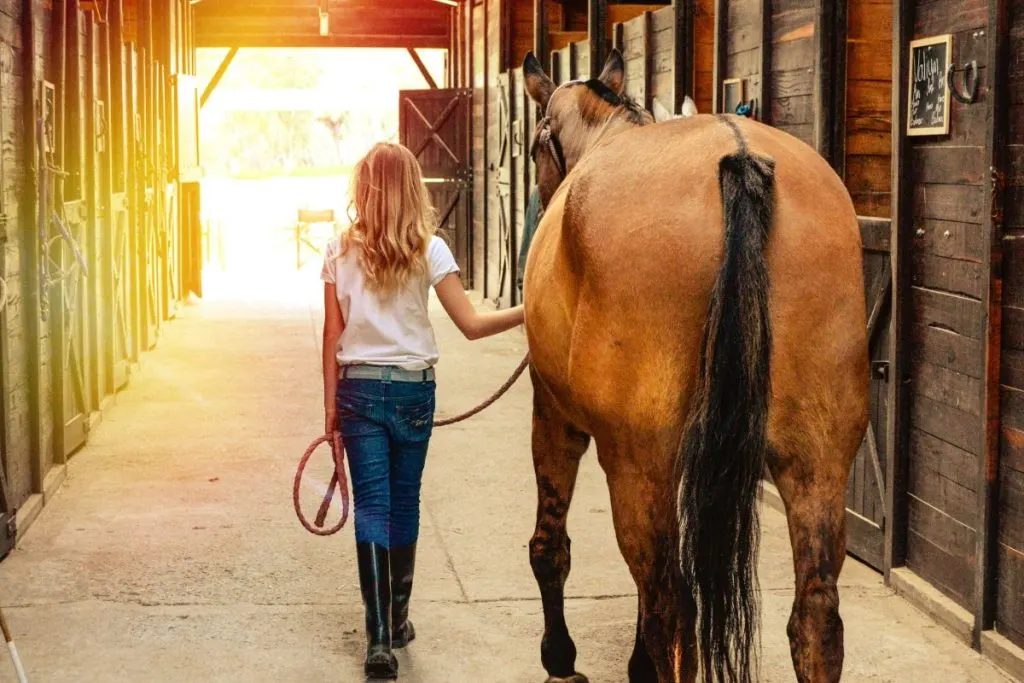There are a lot of things to think about when you’re considering adopting an old horse. You have to consider the horse’s age, health, and temperament, as well as your abilities and resources. But before you even get to that point, you must be aware of some of the problems with adopting an older horse.
1. Dietary Needs
When considering adopting an old horse, it’s important to realize that his dietary needs are probably very different from those of a younger horse. Old horses usually have trouble digesting grains, so their diet should primarily consist of hay and grass. And since older horses tend to be less active, you may need to cut back on their feedings or adjust the amount of hay you’re providing.
If your new senior horse is having problems keeping weight on, talk to your veterinarian about adding supplements and other dietary aids to his diet. Be sure to get the best for joints, ligaments, and bones, such as topical gel or digestive aid. Remember that your old horse depends on you to keep him healthy, so be sure to do everything you can to help him stay nourished and comfortable.
2. Illness or Injury
One of the biggest risks you take when adopting an old horse is that he may be ill or injured. Many older horses have health problems that go undetected until they’re adopted, and some are in such poor condition that they can’t be saved. So before you bring an old horse home, be sure to have him thoroughly checked by a veterinarian.
Walking away from the adoption may be best if the vet finds any major health issues. It’s not worth taking on a horse who may only have a few months or weeks left to live, no matter how much you love him. So keep a close eye on your new senior horse, and don’t hesitate to call your veterinarian if you think something might be wrong.
3. Limited Mobility
As horses age, they can often suffer from a gradual loss of muscle mass and joint flexibility, which makes it difficult for them to move around comfortably. This is especially common in older horses who have spent years working hard in the field. As a result, many old horses spend most of their time lying down.

If this is the case with your new senior horse, you may need to provide him with a comfortable stall or paddock to lie in. You can also help keep his joints healthy and flexible by exercising regularly and providing him with plenty of hay.
When caring for senior horses, it’s essential to pay exceptional attention to their gear. Horse boots and saddles, in particular, must be of the highest quality, as the joints and spine of aging horses become increasingly fragile. Consider exploring well-known products such as LeMieux wool saddle pads for senior horses, as they are known for their moisture-wicking properties. Wool helps keep your horse’s back dry by drawing moisture away, promoting airflow, and providing insulation against both cold and heat. This can help prevent discomfort and pressure sores on your senior horse’s back.
If his joints seem to be making him uncomfortable or in pain, you might want to think about adding a supplement to his diet. For instance, cbd pellets for horses have been found beneficial for joint stiffness, swelling, inflammation, and pain so could be worth considering.
4. Behavioral Issues
Behavioral issues are one of the biggest problems you can face when adopting an old horse. Many older horses have been through a lot in their lives, and as a result, they may be anxious, aggressive, or even violent. They may also have developed bad habits, such as cribbing or stall walking, that are difficult to break. So before bringing an old horse home, be sure to research and find out as much as possible about his behavior.
If you’re not prepared to deal with behavioral issues, walking away from the adoption is best. It’s not worth taking on a horse that may only cause frustration and stress. However, if you’re willing to do the work required to fix behavioral problems, an old horse can make a great pet or companion.
5. Grooming Needs
Like any horse, an old horse needs regular grooming to keep his coat healthy and shiny. But because old horses are often arthritic and may have lost some muscle mass, they can be more difficult to groom than younger horses. So you should take extra care when brushing your senior horse’s mane and tail, cleaning out his hooves, and clipping his coat.
It’s also a good idea to check your senior horse’s teeth regularly, as they can often develop dental problems as they age. And if he is cribbing or stalls walking, you may need to periodically trim his tongue or apply special hoof wraps to help keep him under control.
6. Urinary Tract Problems
Many older horses develop urinary tract problems as they age. This can be caused by various factors, including dehydration, kidney stones, or cancer. So if you’re planning on adopting an old horse, it’s essential to check for signs of urinary tract issues and contact your veterinarian immediately if you notice anything unusual.
Some common symptoms of urinary tract problems in horses include blood in their urine, straining to urinate, and a sudden change in behavior or appetite. If you notice any of these signs, schedule an appointment with your vet immediately so they can diagnose and treat the problem as quickly as possible.
When considering adopting an old horse, you must be aware of the above factors. To deal with these issues effectively, working closely with a professional trainer or veterinarian who can offer guidance and support is important. However, an old horse can make a wonderful companion or pet with the right care and attention.

